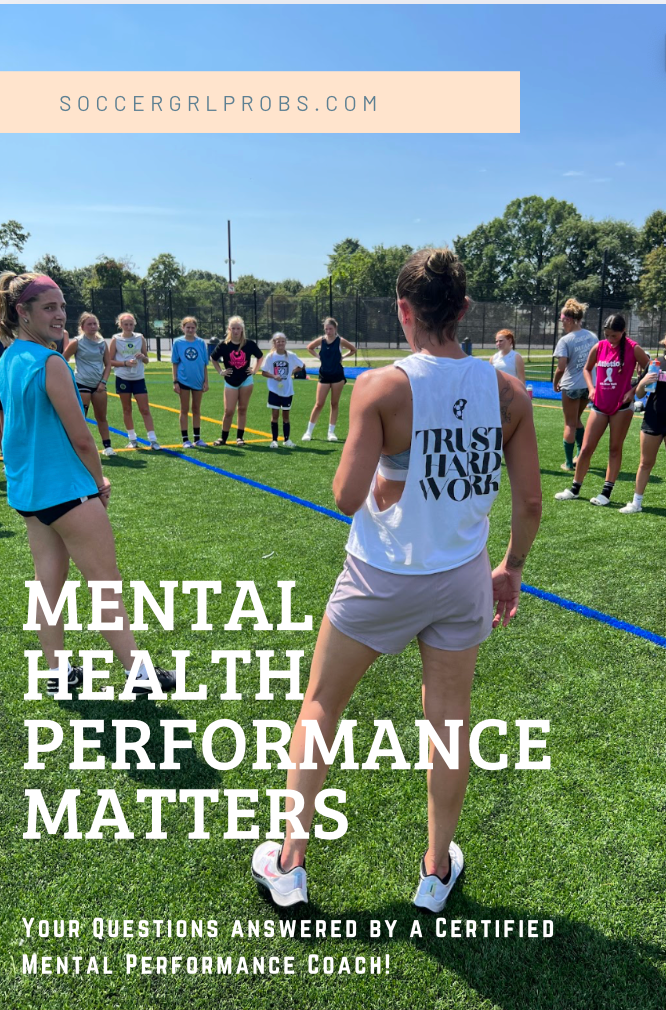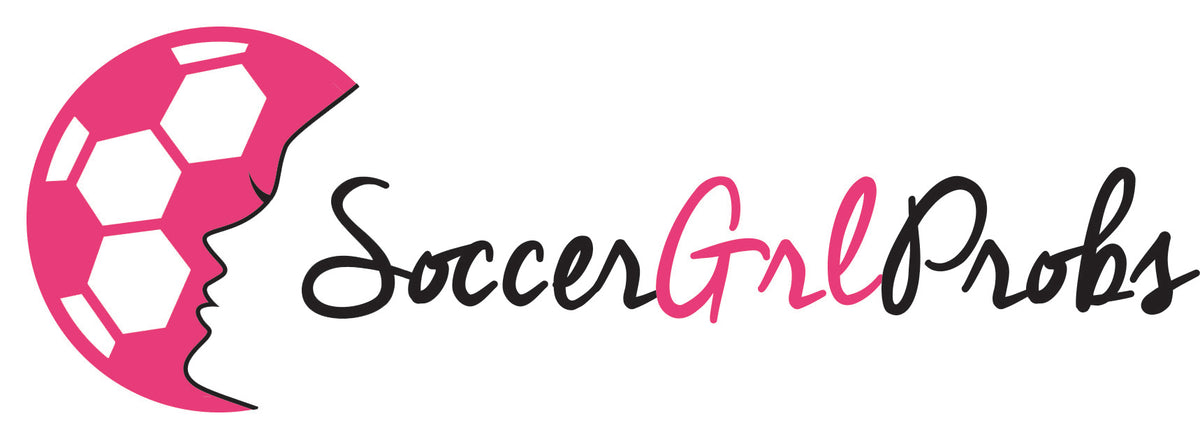
Advice from a Certified Mental Performance Coach
Dr. Lauren Tashman answers your questions!

How can I be a more consistent athlete?
There are three things I would recommend here: 1. performance routines - creating (and adapting when needed) intentional routines (pre-practice, pre-game, refocusing routines, post-game, post-practice, etc.) will help you set yourself up for success, 2. a clear picture for yourself of what you want it to look and feel like when you are at your best (i.e., your core values) - have 2-3 things in mind about how you want to think and play so that those are your compass to avoid having expectations for yourself but not meeting them consistently and to guard against perfectionism and holding yourself to unrealistic standards, and 3. focus on giving the best of what you have on any given day - we are not always going to be at our very best so the more we can focus on the "right" things when we aren't instead of focusing on the fact that we aren't at our best, the more we can ensure we are giving our best effort no matter what

How to beat game day jitters/anxiety? How do you calm your nerves down before a game?
Prepare for the things you are worried about. In practice, in your mental preparation, etc. prepare for stress, pressure, challenge so you are training yourself to feel confident in the face of stress and pressure and developing confidence in your ability to respond resiliently. I would also recommend working on your self-talk and ability to reframe your interpretation of situations and events. Our body reacts the same way to things we are nervous and excited about, so practice being able to change your perspective so that you are excited about the challenge ahead of you rather than worried about what might happen. If you have very high anxiety, then I would recommend incorporating some useful distractions into your pre-game routine so you are taking your mind off things (i.e., keeping it busy on something else).

How do I stop doubting myself with every decision on the field?
Two things that come to mind immediately here - 1. Take more of a growth mindset and deliberate practice approach to your game. The whole point of practicing and playing is to push ourselves outside of our comfort zones, develop and refine our skills, and use every experience good and bad to become better versions of ourselves each and every day. 2. Relatedly - train your decision making. Become a student of the game before the game by thinking about what decisions you might have to make during the game and what the best decisions might be in those situations. And then post-game incorporate reflective practice into your post-competition routine so you are thinking about how you can approach situations you encountered differently in the future (notice I said "differently" there...yes sometimes it is about doing things better, but in most sports and most situations it is about thinking about the different options we have and how we can use those to our advantage).

How do your goalies deal with the pressure of PKs?
The two things I recommend here are pressure training (the more you train yourself to play under pressure in practice the more confident you will feel doing so in game situations) and visualization (our brain doesn't know the difference between what we imagine and what happens in real life so we can use that to our advantage in imagining ourselves in pressure situations, sometimes seeing ourselves being successful and sometimes seeing ourselves responding resiliently when we aren't successful). And, similar to a comment above for another question - manage your expectations of yourself to avoid holding yourself to perfectionistic standards (the greatest goalies in the world have had shots scored on them so you will too, that doesn't mean you aren't a good player).
The answer here also applies to the question about building confidence for risky plays. Prepare yourself in practice and using visualization to practice this and build confidence doing so.
 I never come off the field satisfied/If you screwed up how do you get your mind off of it/My biggest fear is disappointing my teammates:
I never come off the field satisfied/If you screwed up how do you get your mind off of it/My biggest fear is disappointing my teammates:
All of these make me think that you might be focusing on striving for perfection rather than striving for excellence and giving your best effort which isn't always going to mean that you are successful. What I recommend here is clarifying your core values so that you know the few things that you want to represent when you are out there on the field. Use that as your compass thinking about who you want to be out there on the field instead of reinforcing to yourself that you are only successful if you get everything right. And remember, one of the beautiful things about soccer is that you get many chances in a practice or game to focus on the next play. That is what we should be striving for in ourselves and thinking makes a great teammate....someone who brings a great mindset, gives the best effort they can, and keeps trying until time is up. And then we come back the next time and just try again. What we really want out of ourselves is to feel congruent with what matters most to us (our core values) and to be able to trust ourselves, be trusted, and trust others. A great teammate and team is one that holds everyone accountable to effort, mindset, and a great team environment - not just results.

Confidence related to injury:
The challenge with confidence related to injury or concerns about reinjury is that it makes us hesitant or avoidant or we try too hard to not get hurt which all makes us more susceptible rather than less susceptible. We know injury is an inevitable part of sport so part of what we have to do here is accept the risk and build robust confidence in our abilities not confidence that we can protect ourselves from getting injured. So when we can accept this risk, it frees us up to focus on preparing ourselves to play freely. And each time we encounter some adversity, including injury, we have to use it to build our confidence in our ability to overcome that challenge and become better for it. That is actually what resilience is - we can't build resilience if we don't experience adversity and being resilient doesn't mean bouncing back it actually means bouncing forward. Ultimately we have to put our focus on the things we can control (i.e., our mindset, our preparation) and the things we can influence (ex: our team culture) rather than the things we can't control.

Rebuilding confidence after a coach who made me lose it?
Regardless of what caused our confidence to decrease, what I always recommend here is making sure you are using diverse sources to build or rebuild your confidence. The successes you have had, the skills you have mastered, your self talk, your preparation, visualizing yourself being successful (and watching past performances of you being successful), times you have demonstrated your ability, performance routines, etc. I bet if you sit down right now you could list at least 10 reasons why you should/could be confident in yourself - start a list and keep adding to it so that you have evidence to look to when you doubt yourself. That coach was just one data point, use multiple data points to build and rebuild your confidence.

How do I get out of my head or stop overthinking?
The number one thing I recommend here is mindfulness training. You don't have to sit down and meditate for 10 minutes each day necessarily (though research has shown that about 10 minutes at least a few times a week actually changes our brains!), the goal here is to spend some time practicing putting our focus on something (for example our breath) and then noticing when our mind inevitable wanders and starts thinking gently refocusing it back on the intended target of our focus (ex: your breath). This practice of setting our focus and non-judgmentally noticing we need to refocus our mind trains our ability to do that even in the most challenging situations. It helps us create some distance with our minds so that we aren't always caught up in them or thinking they are the source of truth. I think about it like training ourselves to watch ourselves on the rollercoaster rather than always be riding on it. The key here is consistency...same like consistency in physical training. Even if you do this for 30 seconds a few times a day or one minute as part of your morning or pre-practice/game routine the consistency of training your mind in this way will set you up to be able to get out of your head.
Dr. Lauren S. Tashman, CMPC
Check out our full podcast interview with Dr. Lauren Tashman on mental health performance!

Looking for a new podcast? Interested in the world's best performers and leaders journeys? Check out The Path Distilled Podcast.



شركة كيان لنقل العفش بالرياض والمدينة المنورة وجدة ومكة والطائف والدمام تقديم لكم دليل كامل لشركات نقل العفش بالمملكة العربية السعودية
https://mycanadafitness.com/ شركة كيان لنقل العفش
https://mycanadafitness.com/forum.html منتدي نقل العفش
https://mycanadafitness.com/movingfurnitureriyadh.html شركة نقل اثاث بالرياض
https://mycanadafitness.com/movingfurniturejaddah.html شركة نقل اثاث بجدة
https://mycanadafitness.com/movingfurnituremecca.html شركة نقل اثاث بمكة
https://mycanadafitness.com/movingfurnituretaif.html شركة نقل اثاث بالطائف
https://mycanadafitness.com/movingfurnituremadina.html شركة نقل اثاث بالمدينة المنورة
https://mycanadafitness.com/movingfurnituredammam.html شركة نقل اثاث بالدمام
https://mycanadafitness.com/movingfurniturekhobar.html شركة نقل اثاث بالخبر
https://mycanadafitness.com/movingfurnituredhahran.html شركة نقل اثاث بالظهران
https://mycanadafitness.com/movingfurniturejubail.html شركة نقل اثاث بالجبيل
https://mycanadafitness.com/movingfurnitureqatif.html شركة نقل اثاث بالقطيف
https://mycanadafitness.com/movingfurnitureahsa.html شركة نقل اثاث بالاحساء
https://mycanadafitness.com/movingfurniturekharj.html شركة نقل اثاث بالخرج
https://mycanadafitness.com/movingfurniturekhamismushit.html شركة نقل اثاث بخميس مشيط
https://mycanadafitness.com/movingfurnitureabha.html شركة نقل اثاث بابها
https://mycanadafitness.com/movingfurniturenajran.html شركة نقل اثاث بنجران
https://mycanadafitness.com/movingfurniturejazan.html شركة نقل اثاث بجازان
https://mycanadafitness.com/movingfurnitureasir.html شركة نقل اثاث بعسير
https://mycanadafitness.com/movingfurniturehail.html شركة نقل اثاث بحائل
https://mycanadafitness.com/movingfurnitureqassim.html شركة نقل عفش بالقصيم
https://mycanadafitness.com/movingfurnitureyanbu.html شركة نقل اثاث بينبع
https://mycanadafitness.com/movingfurnitureburaidah.html شركة نقل عفش ببريدة
https://mycanadafitness.com/movingfurniturehafralbatin.html شركة نقل عفش بحفر الباطن
https://mycanadafitness.com/movingfurniturerabigh.html شركة نقل عفش برابغ
https://mycanadafitness.com/movingfurnituretabuk.html شركة نقل عفش بتبوك
https://mycanadafitness.com/movingfurnitureasfan.html شركة نقل عفش بعسفان
https://mycanadafitness.com/movingfurnituresharora.html شركة نقل عفش بشرورة
https://mycanadafitness.com/companis-moving-riyadh.html شركات نقل العفش بالرياض
https://mycanadafitness.com/cars-moving-riyadh.html سيارات نقل العفش بالرياض
https://mycanadafitness.com/company-number-moving-riyadh.html ارقام شركات نقل العفش بالرياض
https://mycanadafitness.com/company-moving-jeddah.html شركات نقل العفش بجدة
https://mycanadafitness.com/price-moving-jeddah.html اسعار نقل العفش بجدة
https://mycanadafitness.com/company-moving-mecca.html شركات نقل العفش بمكة
شركة سكاي لخدمات نقل العفش والاثاث بالمنطقة العربية السعودية نحن نوفر خدمات نقل اثاث بالرياض ونقل عفش بالمدينة المنورة ونقل عفش بمكة ونقل عفش بالطائف نحن نقدم افضل نقل اثاث بخميس مشيط ونقل عفش بجدة
https://treeads.net/ شركة سكاي نقل العفش
https://treeads.net/blog.html مدونة لنقل العفش
https://treeads.net/movers-mecca.html شركة نقل عفش بمكة
https://treeads.net/movers-riyadh-company.html شركة نقل عفش بالرياض
https://treeads.net/all-movers-madina.html شركة نقل عفش بالمدينة المنورة
https://treeads.net/movers-jeddah-company.html شركة نقل عفش بجدة
https://treeads.net/movers-taif.html شركة نقل عفش بالطائف
https://treeads.net/movers-dammam-company.html شركة نقل عفش بالدمام
https://treeads.net/movers-qatif.html شركة نقل عفش بالقطيف
https://treeads.net/movers-jubail.html شركة نقل عفش بالجبيل
https://treeads.net/movers-khobar.html شركة نقل عفش بالخبر
https://treeads.net/movers-ahsa.html شركة نقل عفش بالاحساء
https://treeads.net/movers-kharj.html شركة نقل عفش بالخرج
https://treeads.net/movers-khamis-mushait.html شركة نقل عفش بخميس مشيط
https://treeads.net/movers-abha.html شركة نقل عفش بابها
https://treeads.net/movers-qassim.html شركة نقل عفش بالقصيم
https://treeads.net/movers-yanbu.html شركة نقل عفش بينبع
https://treeads.net/movers-najran.html شركة نقل عفش بنجران
https://treeads.net/movers-hail.html شركة نقل عفش بحائل
https://treeads.net/movers-buraydah.html شركة نقل عفش ببريدة
https://treeads.net/movers-tabuk.html شركة نقل عفش بتبوك
https://treeads.net/movers-dhahran.html شركة نقل عفش بالظهران
https://treeads.net/movers-rabigh.html شركة نقل عفش برابغ
https://treeads.net/movers-baaha.html شركة نقل عفش بالباحه
https://treeads.net/movers-asseer.html شركة نقل عفش بعسير
https://treeads.net/movers-mgmaa.html شركة نقل عفش بالمجمعة
https://treeads.net/movers-sharora.html شركة نقل عفش بشرورة
https://treeads.net/how-movers-furniture-yanbu.html كيفية نقل العفش بينبع
https://treeads.net/price-movers-furniture-yanbu.html اسعار نقل عفش بينبع
https://treeads.net/find-company-transfer-furniture-yanbu.html البحث عن شركات نقل العفش بينبع
https://treeads.net/transfer-furniture-khamis-mushit.html شركات نقل العفش بخميس مشيط
https://treeads.net/how-transfer-furniture-khamis-mushit.html كيفية نقل العفش بخميس مشيط
https://treeads.net/price-transfer-furniture-khamis-mushit.html اسعار نقل عفش بخميس مشيط
https://treeads.net/%D8%B4%D8%B1%D9%83%D8%A9-%D8%AC%D9%84%D9%8A-%D8%A8%D9%84%D8%A7%D8%B7-%D8%A8%D8%AC%D8%AF%D8%A9.html شركة جلي بلاط بجدة
https://treeads.net/%D8%B4%D8%B1%D9%83%D8%A9-%D8%AA%D9%86%D8%B8%D9%8A%D9%81-%D9%81%D9%84%D9%84-%D8%A8%D8%AC%D8%AF%D8%A9.html تنظيف فلل بجدة
https://treeads.net/company-transfer-furniture-jazan.html شركة نقل عفش بجازان
https://treeads.net/best-company-cleaning-jeddah-2020.html افضل شركة تنظيف بجدة
https://emcmee.blogspot.com/2022/08/transfer-furniture-jeddah.html
https://www.khedmeh.com/wall/blogs/post/12991
https://www.khedmeh.com/wall/blogs/12905
https://www.b-webdesign.org/dir-wowonder/read-blog/95246
https://www.b-webdesign.org/dir-wowonder/read-blog/95225
https://joyrulez.com/blogs/168166/%D8%B4%D8%B1%D9%83%D8%A7%D8%AA-%D9%86%D9%82%D9%84-%D8%A7%D9%84%D8%B9%D9%81%D8%B4-%D8%A8%D8%AC%D8%AF%D8%A9
https://joyrulez.com/blogs/168162/%D8%B4%D8%B1%D9%83%D8%A7%D8%AA-%D9%84%D9%86%D9%82%D9%84-%D8%A7%D9%84%D8%B9%D9%81%D8%B4-%D9%81%D9%8A-%D8%AC%D8%AF%D8%A9
https://demo.sngine.com/blogs/102320/%D9%86%D9%82%D9%84-%D8%B9%D9%81%D8%B4-%D8%A8%D8%AC%D8%AF%D8%A9
https://demo.sngine.com/blogs/101980/%D8%A7%D9%81%D8%B6%D9%84-%D8%B4%D8%B1%D9%83%D8%A9-%D9%86%D9%82%D9%84-%D8%B9%D9%81%D8%B4-%D8%A8%D8%AC%D8%AF%D8%A9-emc-mee-com-transfer-furniture
https://emc-mee.page.tl/%26%231575%3B%26%231585%3B%26%231602%3B%26%231575%3B%26%231605%3B-%26%231588%3B%26%231585%3B%26%231603%3B%26%231575%3B%26%231578%3B-%26%231606%3B%26%231602%3B%26%231604%3B-%26%231593%3B%26%231601%3B%26%231588%3B-%26%231576%3B%26%231580%3B%26%231583%3B%26%231577%3B.htm
https://ataralmadinah662300791.wordpress.com/2022/09/05/%d8%b4%d8%b1%d9%83%d8%a9-%d9%86%d9%82%d9%84-%d8%b9%d9%81%d8%b4-%d9%85%d9%86-%d8%ac%d8%af%d8%a9-%d8%a7%d9%84%d9%89-%d8%aa%d8%a8%d9%88%d9%83-%d9%85%d8%b9-%d8%a7%d9%84%d8%aa%d8%ba%d9%84%d9%8a%d9%81/
https://atar-almadinah.over-blog.com/2022/09/transfer-furniture-jeddah-tabuk.html
https://eslamiatview.blogspot.com/2022/09/transfer-furniture-.html
https://is.gd/bJ2Dmy
https://is.gd/ypnMEL
https://is.gd/BLejy1
https://is.gd/nHp6N4
https://is.gd/BtLzld
https://is.gd/zxECuM
https://is.gd/i4mxfM
https://is.gd/DsIPbe
https://cutt.ly/tCzFRi0
https://cutt.ly/ECzF3dA
https://cutt.ly/oCzGwW6
https://is.gd/GfoG2V
https://is.gd/mX0WTb
https://cutt.ly/ACzGRPF
https://is.gd/SLAkcT
https://cutt.ly/TCzGPlc
https://rb.gy/doq4qv
https://rb.gy/f6lina
https://rb.gy/lfqg9r
https://rb.gy/nrko3x
https://rb.gy/xhuggi
https://rb.gy/lbp0ea
https://rb.gy/wsgbj0
https://rb.gy/eumloo
https://rb.gy/foooha
https://rb.gy/po1lxc
https://rb.gy/fqpdsz
https://is.gd/9SdaEc
https://cutt.ly/qCzJbUt
https://www.vingle.net/posts/4729609
https://www.vingle.net/posts/4729610
https://rb.gy/eimwki
https://rb.gy/ionvkh
https://cutt.ly/7CzZUSh
https://is.gd/DEo87A
https://cutt.ly/eCzZAiQ
https://is.gd/rUreg8
https://hackmd.io/moversjeddah/By88RRJxs https://jeddah.peatix.com/ https://unsplash.com/moversjeddah
https://moversriyadhcom.wordpress.com/2022/09/09/%d8%b4%d8%b1%d9%83%d8%a7%d8%aa-%d9%86%d9%82%d9%84-%d8%b9%d9%81%d8%b4-%d8%a8%d9%85%d9%83%d8%a9/
https://moversriyadhcom.wordpress.com/2022/09/09/%d8%a7%d9%81%d8%b6%d9%84-%d8%b4%d8%b1%d9%83%d8%a9-%d9%86%d9%82%d9%84-%d8%b9%d9%81%d8%b4-%d8%a8%d8%a7%d9%84%d8%a7%d8%ad%d8%b3%d8%a7%d8%a1/
https://moversriyadhcom.wordpress.com/2022/09/10/%d8%a7%d9%81%d8%b6%d9%84-%d8%b4%d8%b1%d9%83%d8%a9-%d9%86%d9%82%d9%84-%d8%b9%d9%81%d8%b4-%d8%a8%d8%a7%d9%84%d8%ae%d8%a8%d8%b1/
https://moversriyadhcom.wordpress.com/2022/09/10/%d8%a7%d9%81%d8%b6%d9%84-%d8%b4%d8%b1%d9%83%d8%a9-%d9%86%d9%82%d9%84-%d8%b9%d9%81%d8%b4-%d8%a8%d8%ac%d8%af%d8%a9/
https://moversfurniture.over-blog.com/transfer-jeddah.html
https://moversfurniture.over-blog.com/movers-furniture-jeddah.html
https://hackmd.io/@jeddahmovers/rJMNqojxj
https://www.skreebee.com/read-blog/115087
https://oktob.io/posts/43829
https://telegra.ph/%D8%B4%D8%B1%D9%83%D8%A9-%D9%86%D9%82%D9%84-%D8%B9%D9%81%D8%B4-%D9%85%D9%86-%D8%AC%D8%AF%D8%A9-%D8%A7%D9%84%D9%89-%D8%AA%D8%A8%D9%88%D9%83-09-12
https://ataralmadinah662300791.wordpress.com/2022/09/12/%d8%a7%d8%b1%d9%82%d8%a7%d9%85-%d8%b4%d8%b1%d9%83%d8%a7%d8%aa-%d9%86%d9%82%d9%84-%d8%a7%d9%84%d8%b9%d9%81%d8%b4-%d8%a8%d8%ac%d8%af%d8%a9/
https://rb.gy/rl7jzc
https://cutt.ly/NCZt6Jm
https://is.gd/A89d52
https://atar-almadinah.over-blog.com/numbers-company-transfer-furniture.html
https://oktob.io/posts/43903
https://telegra.ph/%D8%A7%D8%B1%D9%82%D8%A7%D9%85-%D8%B4%D8%B1%D9%83%D8%A7%D8%AA-%D9%86%D9%82%D9%84-%D8%B9%D9%81%D8%B4-%D9%88%D8%A7%D8%AB%D8%A7%D8%AB-%D8%A8%D8%AC%D8%AF%D8%A9-09-12
https://www.skreebee.com/read-blog/115193
https://hackmd.io/jeddahmovers/B1Is9m6li https://hackmd.io/jeddahmovers/B1Ux7Vpxj
https://hackmd.io/@jeddahmovers/S1g3xLaxj
https://addandclick.com/read-blog/94597
https://webyourself.eu/blogs/36223/%D8%A7%D8%B1%D9%82%D8%A7%D9%85-%D8%B4%D8%B1%D9%83%D8%A7%D8%AA-%D9%86%D9%82%D9%84-%D8%B9%D9%81%D8%B4-%D9%88%D8%A7%D8%AB%D8%A7%D8%AB-%D8%A8%D8%AC%D8%AF%D8%A9
https://moversriyadhcom.wordpress.com/2022/09/13/%d9%90%d8%b4%d8%b1%d9%83%d8%a9-%d9%86%d9%82%d9%84-%d8%b9%d9%81%d8%b4-%d8%a8%d8%ac%d8%a7%d8%b2%d8%a7%d9%86/
https://www.scoop.it/topic/rcutioni/p/4135811249/2022/09/19/25-0545970806-65
https://www.scoop.it/topic/rcutioni/p/4135811200/2022/09/19/0500175959-55
https://www.scoop.it/topic/rcutioni/p/4135809640/2022/09/19/0500175959-45
https://www.scoop.it/topic/rcutioni/p/4135810312/2022/09/19/0500175959-50
https://ko-fi.com/jumperads49641
https://hackmd.io/jumperads/Syzi0PCei https://hackmd.io/jumperads/B1Z2f_Cgj
https://khairyayman85.wixsite.com/jumperads
https://allmoversinriyadh.wordpress.com/2022/09/15/%d8%a7%d9%81%d8%b6%d9%84-%d8%b4%d8%b1%d9%83%d8%a9-%d8%aa%d9%86%d8%b8%d9%8a%d9%81-%d8%a8%d9%8a%d9%86%d8%a8%d8%b9/
https://allmoversinriyadh.wordpress.com/2022/09/14/%d8%a7%d9%81%d8%b6%d9%84-%d8%b4%d8%b1%d9%83%d8%a9-%d8%aa%d9%86%d8%b8%d9%8a%d9%81-%d8%a8%d8%ae%d9%85%d9%8a%d8%b3-%d9%85%d8%b4%d9%8a%d8%b7/
https://allmoversinriyadh.wordpress.com/2022/09/14/%d8%a7%d9%81%d8%b6%d9%84-%d8%b4%d8%b1%d9%83%d8%a9-%d8%aa%d9%86%d8%b8%d9%8a%d9%81-%d8%a8%d8%a7%d9%84%d8%b1%d9%8a%d8%a7%d8%b6-2/
https://allmoversinriyadh.wordpress.com/2022/04/07/%d8%a7%d9%81%d8%b6%d9%84-%d8%b4%d8%b1%d9%83%d8%a9-%d8%aa%d9%86%d8%b8%d9%8a%d9%81-%d8%a8%d8%a7%d9%84%d8%b1%d9%8a%d8%a7%d8%b6/
https://www.atar-almadinah.com/%D8%B4%D8%B1%D9%83%D8%A9-%D8%AA%D8%AE%D8%B2%D9%8A%D9%86-%D8%B9%D9%81%D8%B4-%D8%A8%D8%A7%D8%A8%D9%87%D8%A7.html
https://www.atar-almadinah.com/%D8%B4%D8%B1%D9%83%D8%A9-%D8%AA%D8%BA%D9%84%D9%8A%D9%81-%D8%A7%D9%84%D8%B9%D9%81%D8%B4-%D8%A8%D8%A7%D8%A8%D9%87%D8%A7.html
https://www.atar-almadinah.com/%D8%B4%D8%B1%D9%83%D8%A9-%D8%AA%D8%BA%D9%84%D9%8A%D9%81-%D8%A7%D8%AB%D8%A7%D8%AB-%D8%A8%D8%A7%D9%84%D8%B1%D9%8A%D8%A7%D8%B6.html
https://www.atar-almadinah.com/%D8%B4%D8%B1%D9%83%D8%A9-%D8%A7%D9%84%D8%B5%D9%81%D8%B1%D8%A7%D8%AA-%D9%84%D9%86%D9%82%D9%84-%D8%A7%D9%84%D8%B9%D9%81%D8%B4-%D8%A8%D8%A7%D9%84%D8%B1%D9%8A%D8%A7%D8%B6.html
https://www.atar-almadinah.com/%D8%B4%D8%B1%D9%83%D8%A9-%D9%86%D9%82%D9%84-%D8%B9%D9%81%D8%B4-%D8%A8%D8%A7%D8%AD%D8%AF-%D8%B1%D9%81%D9%8A%D8%AF%D8%A9.html
https://www.atar-almadinah.com/%D8%A7%D8%B1%D8%AE%D8%B5-%D8%B4%D8%B1%D9%83%D8%A7%D8%AA-%D9%86%D9%82%D9%84-%D8%B9%D9%81%D8%B4-%D8%A8%D9%8A%D9%86-%D8%A7%D9%84%D9%85%D8%AF%D9%86.html
شركة مكافحة حشرات بالقطيف وكذلك شركة كشف تسربات المياه بالقطيف وتنظيف خزانات وتنظيف الموكيت والسجاد والكنب والشقق والمنازل بالقطيف وتنظيف الخزانات بالقطيف وتنظيف المساجد بالقطيف شركة تنظيف بالقطيف تنظيف المسابح بالقطيف
https://jumperads.com/qatif/anti-insects-company-qatif.html شركة مكافحة حشرات بالقطيف
https://jumperads.com/qatif/water-leaks-detection-company-qatif.html شركة كشف تسربات بالقطيف
https://jumperads.com/qatif/qatif-company-surfaces.html شركة عزل اسطح بالقطيف
https://jumperads.com/qatif/qatif-company-sewage.html شركة تسليك مجاري بالقطيف
https://jumperads.com/qatif/qatif-cleaning-company-sofa.html شركة تنظيف كنب بالقطيف
https://jumperads.com/qatif/qatif-cleaning-company-mosques.html شركة تنظيف مساجد بالقطيف
https://jumperads.com/qatif/qatif-cleaning-company-Carpet.html شركة تنظيف سجاد بالقطيف
https://jumperads.com/qatif/qatif-cleaning-company-tanks.html شركة تنظيف خزانات بالقطيف
https://jumperads.com/qatif/qatif-cleaning-company-swimming-bath.html شركة تنظيف وصيانة مسابح بالقطيف
https://jumperads.com/qatif/qatif-cleaning-company-Furniture.html شركة تنظيف الاثاث بالقطيف
https://jumperads.com/qatif/qatif-cleaning-company-home.html شركة تنظيف شقق بالقطيف
https://jumperads.com/qatif/qatif-cleaning-company-Carpets.html شركة تنظيف موكيت بالقطيف
https://jumperads.com/qatif/qatif-cleaning-company.html شركة تنظيف مجالس بالقطيف
https://jumperads.com/qatif/qatif-cleaning-company-house.html شركة تنظيف منازل بالقطيف
https://jumperads.com/qatif/qatif-cleaning-company-curtains.html شركة تنظيف ستائر بالقطيف
https://jumperads.com/qatif/qatif-cleaning-company-Villas.html شركة تنظيف فلل بالقطيف
https://jumperads.com/qatif/qatif-company-tile.html شركة جلي بلاط بالقطيف